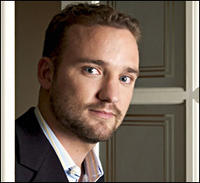Trudeau and 'embedded journalism'
 On campus today, we were treated to a presentation by Alexandre Trudeau, one of the sons of former Prime Minister Pierre Elliott Trudeau. Alexandre is a Canadian filmmaker who is known for his style of 'embedded journalism', particularly in locations such as Iraq, Israel, the West Bank, Liberia, and other areas of conflict. He lives with the people of the area, and works to tell their personal stories, in order to convey a different aspect of the situation.
On campus today, we were treated to a presentation by Alexandre Trudeau, one of the sons of former Prime Minister Pierre Elliott Trudeau. Alexandre is a Canadian filmmaker who is known for his style of 'embedded journalism', particularly in locations such as Iraq, Israel, the West Bank, Liberia, and other areas of conflict. He lives with the people of the area, and works to tell their personal stories, in order to convey a different aspect of the situation.The clips of his documentaries were very interesting, particularly those from Baghdad and Jenin. Sure, we all see the typical footage from these war zones, but the way in which he portays these regions is somehow more powerful. The views from a moving car in Baghdad of burning buildings, abandoned markets and desolate streets are way more effective than the footage we are given from CNN in terms of conveying the true nature of the conflict. He highlighted the need to make these stories in far-off lands personal, to make those human bonds. I also found him to be very articulate (I guess it runs in the family), expressing his opinions very clearly and responding to some rather blunt questions with equal aplomb.
He certainly wasn't as controversial as Ya'acov Brosh, the Israel Consul-General who spoke here several weeks ago, but it was still interesting to hear him speak. I'd encourage anyone to try and see his documentaries, particularly those about Iraq and the Israel-Palestinian conflict. They offer a refreshing new look at old news stories - embedded journalism, as it has been termed, is an important way of telling stories that I hope we see more of in the future.



